【尚友制造】SAT真题答案解析(2013.5北美卷)
- 格式:pdf
- 大小:12.21 MB
- 文档页数:24
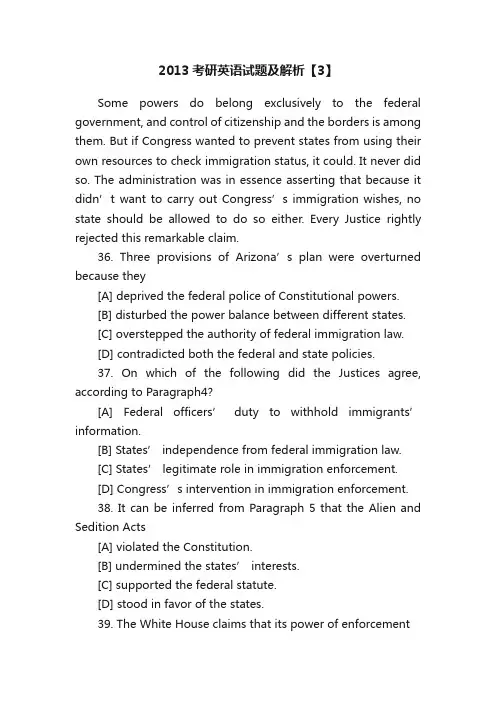
2013考研英语试题及解析【3】Some powers do belong exclusively to the federal government, and control of citizenship and the borders is among them. But if Congress wanted to prevent states from using their own resources to check immigration status, it could. It never did so. The administration was in essence asserting that because it didn’t want to carry out Congress’s immigration wishes, no state should be allowed to do so either. Every Justice rightly rejected this remarkable claim.36. Three provisions of Arizona’s plan were overturned because they[A] deprived the federal police of Constitutional powers.[B] disturbed the power balance between different states.[C] overstepped the authority of federal immigration law.[D] contradicted both the federal and state policies.37. On which of the following did the Justices agree, according to Paragraph4?[A] Federal officers’ duty to withhold immigrants’ information.[B] States’ independence from fed eral immigration law.[C] States’ legitimate role in immigration enforcement.[D] Congress’s intervention in immigration enforcement.38. It can be inferred from Paragraph 5 that the Alien and Sedition Acts[A] violated the Constitution.[B] undermined the states’ interests.[C] supported the federal statute.[D] stood in favor of the states.39. The White House claims that its power of enforcement[A] outweighs that held by the states.[B] is dependent on the states’ support.[C] is established by federal statutes.[D] rarely goes against state laws.40. What can be learned from the last paragraph?[A] Immigration issues are usually decided by Congress.[B] Justices intended to check the power of the Administration.[C] Justices wanted to strengthen its coordination with Congress.[D] The Administration is dominant over immigration issues.答案:36- CCDAD答案详解:36.标准答案: C考点分析:此题考查考生对文章细节信息的把握能力选项分析:根据题干中的关键词 three provisions of Arizona定位到文中第二段。
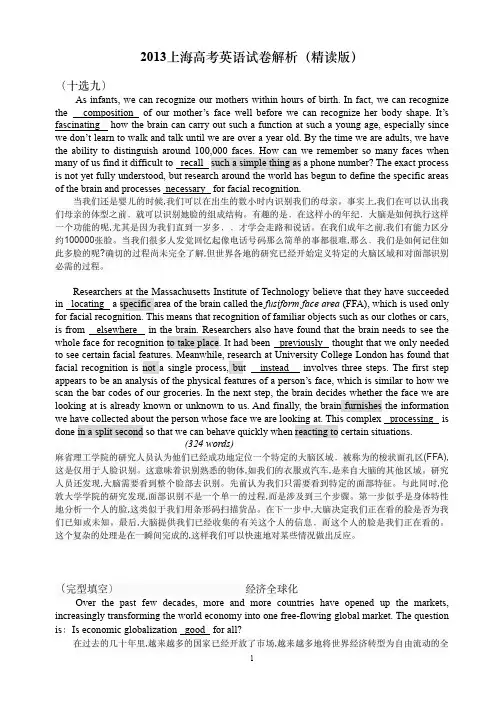

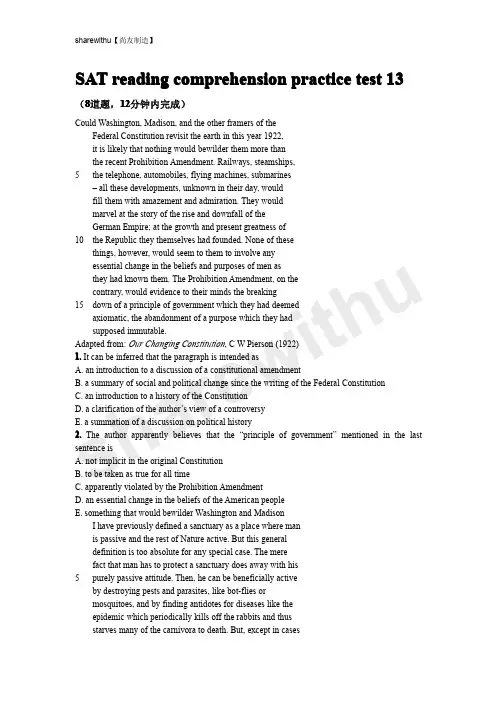
SAT reading comprehension practice test13(8道题,12分钟内完成)Could Washington,Madison,and the other framers of theFederal Constitution revisit the earth in this year1922,it is likely that nothing would bewilder them more thanthe recent Prohibition Amendment.Railways,steamships,5the telephone,automobiles,flying machines,submarines–all these developments,unknown in their day,wouldfill them with amazement and admiration.They wouldmarvel at the story of the rise and downfall of theGerman Empire;at the growth and present greatness of10the Republic they themselves had founded.None of thesethings,however,would seem to them to involve anyessential change in the beliefs and purposes of men asthey had known them.The Prohibition Amendment,on thecontrary,would evidence to their minds the breaking15down of a principle of government which they had deemedaxiomatic,the abandonment of a purpose which they hadsupposed immutable.Adapted from:Our Changing Constitution,C W Pierson(1922)1.It can be inferred that the paragraph is intended asA.an introduction to a discussion of a constitutional amendmentB.a summary of social and political change since the writing of the Federal ConstitutionC.an introduction to a history of the ConstitutionD.a clarification of the author’s view of a controversyE.a summation of a discussion on political history2.The author apparently believes that the“principle of government”mentioned in the last sentence isA.not implicit in the original ConstitutionB.to be taken as true for all timeC.apparently violated by the Prohibition AmendmentD.an essential change in the beliefs of the American peopleE.something that would bewilder Washington and MadisonI have previously defined a sanctuary as a place where manis passive and the rest of Nature active.But this generaldefinition is too absolute for any special case.The merefact that man has to protect a sanctuary does away with his5purely passive attitude.Then,he can be beneficially activeby destroying pests and parasites,like bot-flies ormosquitoes,and by finding antidotes for diseases like theepidemic which periodically kills off the rabbits and thusstarves many of the carnivora to death.But,except in cases10where experiment has proved his intervention to bebeneficial,the less he upsets the balance of Nature thebetter,even when he tries to be an earthly Providence.Adapted from:Animal Sanctuaries in Labrador,W Wood(1911)3.The author implies that his first definition of a sanctuary isA.totally wrongB.somewhat idealisticC.unhelpfulD.indefensibleE.immutable4.The author’s argument that destroying bot-flies and mosquitoes would be a beneficial action is most weakened by all of the following exceptA.parasites have an important role to play in the regulation of populationsB.the elimination of any species can have unpredictable effects on the balance of natureC.the pests themselves are part of the food chainD.these insects have been introduced to the area by human activitiesE.elimination of these insects would require the use of insecticides that kill a wide range of insectsParagraph oneThat Priestley's contributions to the knowledge of chemicalfact were of the greatest importance is unquestionable;butit must be admitted that he had no comprehension of thedeeper significance of his work;and,so far from5contributing anything to the theory of the facts which hediscovered,or assisting in their rational explanation,his influence to the end of his life was warmly exerted infavor of error.From first to last,he was a stiff adherentof the phlogiston doctrine which was prevalent when his10studies commenced;and,by a curious irony of fate,the manwho by the discovery of what he called"dephlogisticated air"furnished the essential datum for the true theory ofcombustion,of respiration,and of the composition of water,to the end of his days fought against the inevitable15corollaries from his own labors.Paragraph twoIt is a trying ordeal for any man to be compared with Blackand Cavendish,and Priestley cannot be said to stand ontheir level.Nevertheless his achievements are trulywonderful if we consider the disadvantages under which he20labored.Without the careful scientific training of Black,without the leisure and appliances secured by the wealth ofCavendish,he scaled the walls of science;and trusting tomother wit to supply the place of training,and to ingenuityto create apparatus out of washing tubs,he discovered more25new gases(including oxygen,which he termed“dephlogisticated air”)than all his predecessors puttogether had done.Both passages adapted from:Science&Education,T H Huxley(1893)5.Which pairing best reflects the main emphasis of the two passages?The first focuses mainly on Priestley’sA.discoveries of chemical fact;the second on his ingenuityB.discovery of“dephlogisticated air”;the second on his discoveries of gasesck of theoretical understanding;the second on his lack of trainingD.importance to future science;the second on his status in relation to his contemporariesE.theoretical misconceptions;the second on his success in the face of disadvantage6.It can be inferred that“dephlogisticated air”isI a misnomer,but relating to something importantII a gaseous substance discovered by PriestleyII something not fully understood by PreistleyA.I onlyB.II onlyC.I and IIID.II and IIIE.I,II and III7.The metaphor“scaled the walls of science”conveys the idea that PriestleyA.climbed to the pinnacle of scienceB.fought his way to the topC.escaped the confines of traditional ideasD.achieved success in a difficult endeavorE.clawed his way up against opposition8.The attitude of both the passages to Priestley’s scientific work could be described asA.firm disapprovalB.wholehearted praiseC.qualified approvalD.determined neutralityE.ambivalencePractice Test13Question Your Answer Correct Answer1.A2.C3.B4.D5.E6.E7.D8.C。
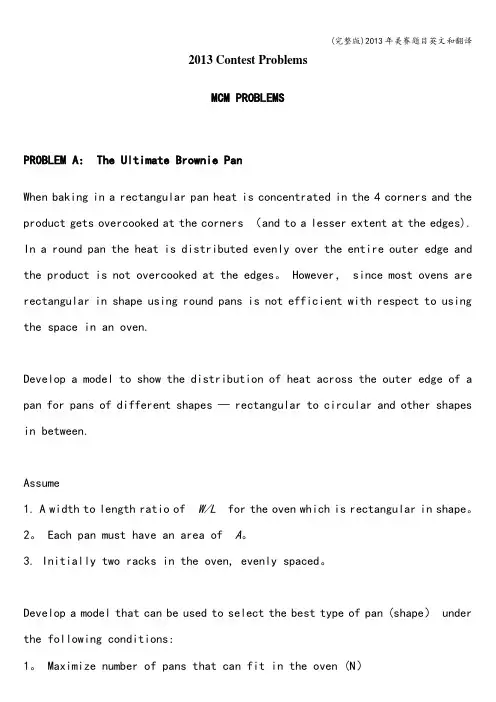
2013 Contest ProblemsMCM PROBLEMSPROBLEM A: The Ultimate Brownie PanWhen baking in a rectangular pan heat is concentrated in the 4 corners and the product gets overcooked at the corners (and to a lesser extent at the edges). In a round pan the heat is distributed evenly over the entire outer edge and the product is not overcooked at the edges。
However, since most ovens are rectangular in shape using round pans is not efficient with respect to using the space in an oven.Develop a model to show the distribution of heat across the outer edge of a pan for pans of different shapes — rectangular to circular and other shapes in between.Assume1. A width to length ratio of W/L for the oven which is rectangular in shape。
2。
Each pan must have an area of A。
3. Initially two racks in the oven, evenly spaced。
Develop a model that can be used to select the best type of pan (shape) under the following conditions:1。
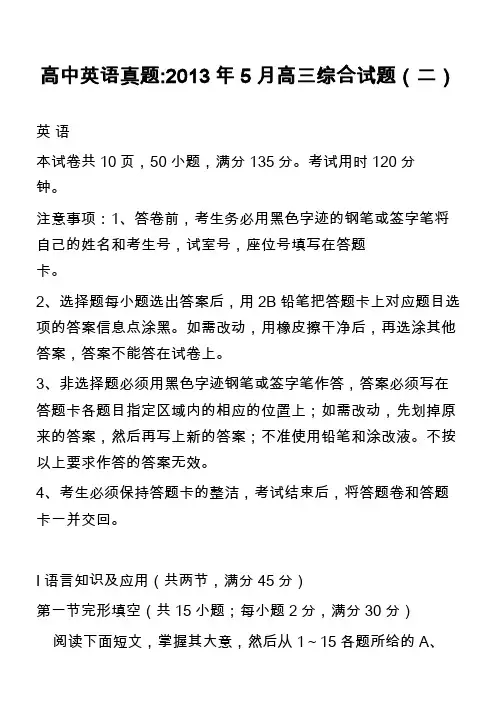
高中英语真题:2013年5月高三综合试题(二)英语本试卷共10页,50小题,满分135分。
考试用时120分钟。
注意事项:1、答卷前,考生务必用黑色字迹的钢笔或签字笔将自己的姓名和考生号,试室号,座位号填写在答题卡。
2、选择题每小题选出答案后,用2B铅笔把答题卡上对应题目选项的答案信息点涂黑。
如需改动,用橡皮擦干净后,再选涂其他答案,答案不能答在试卷上。
3、非选择题必须用黑色字迹钢笔或签字笔作答,答案必须写在答题卡各题目指定区域内的相应的位置上;如需改动,先划掉原来的答案,然后再写上新的答案;不准使用铅笔和涂改液。
不按以上要求作答的答案无效。
4、考生必须保持答题卡的整洁,考试结束后,将答题卷和答题卡一并交回。
I语言知识及应用(共两节,满分45分)第一节完形填空(共15小题;每小题2分,满分30分)阅读下面短文,掌握其大意,然后从1~15各题所给的A、B、C和D项中,选出最佳选项,并在答题卡上将该项涂黑。
In America,drivers education is part of the regular high school curriculum. E very student in his or her second year of high school is required to 1 a class in drivers education.However,unlike other 2 ,it is not given during the 3 school year. Instead it is a summer course. The course is divided up into two parts:class time for learning laws and 4 and driving time to practice driving. Class time is not unlike any other class. The students h ave a 5 from which they study the basic 6 they must know to pass the written driving test that is given to anyone wanting to get a driver’s 7 .Driving time is a chance for the students to get behind the steeri ng wheel and practice start,steering,backing up,parking,switching lanes,turning corners,and all the other operations 8 to drive a car. Each student is re quired to drive a total of six 9 .The students are divided up into groups of four. The students and the instructor go out driving for two-hour blocks of time. Thus,each student gets half an hour driving time per outing. The instr uctor and “driver” sit in 10 seats and the other three students s it in the back.Drivers ED cars are unlike other cars in which they have two se ts of brakes,one on driver side and one on the other side where the 11 sits . Thus,if the student driver should run into 12 ,the instructor can take over. The car also has another 13 featur e. On the top of the car is a sign that 14 :STUDENT DRIVER. That lets nearby drivers know that they sh ould use extra caution because the student driver is a beginning driver,not very experienced and intended to drive 15 .1. A. give B. takeC. startD. seat【答案】B【解析】在美国高二的学生要求上驾驶课。
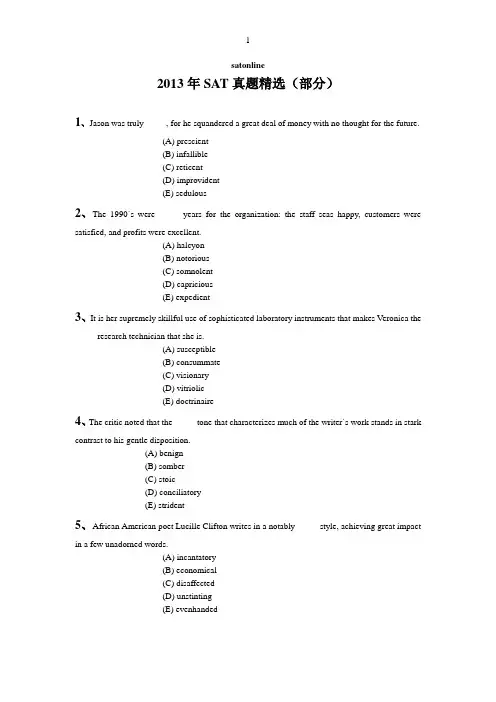
2013年SAT真题精选(部分)1、Jason was truly -------, for he squandered a great deal of money with no thought for the future.(A) prescient(B) infallible(C) reticent(D) improvident(E) sedulous2、The 1990`s were ------- years for the organization: the staff seas happy, customers weresatisfied, and profits were excellent.(A) halcyon(B) notorious(C) somnolent(D) capricious(E) expedient3、It is her supremely skillful use of sophisticated laboratory instruments that makes Veronica the------- research technician that she is.(A) susceptible(B) consummate(C) visionary(D) vitriolic(E) doctrinaire4、The critic noted that the ------- tone that characterizes much of the writer`s work stands in starkcontrast to his gentle disposition.(A) benign(B) somber(C) stoic(D) conciliatory(E) strident5、African American poet Lucille Clifton writes in a notably ------- style, achieving great impactin a few unadorned words.(A) incantatory(B) economical(C) disaffected(D) unstinting(E) evenhanded6、The scientist ------- the value of an interdisciplinary approach to environmental studies, arguingsuch an approach was of ------- importance in promoting environmental literacy among students.(A) invoked .. marginal(B) touted .. paramount(C) ignored .. unprecedented(D) disparaged .. unparalleled(E) extolled .. questionable7、Jessica was ------- by Jon`s angry outburst: she literally did not know what to say think, or do.(A) disenchanted(B) peeved(C) assuaged(D) beguiled(E) nonplussed8、The slogan "What goes up must come down" was so universally accepted by economists that itwas considered(A) a conjecture(B) an axiom(C) a fad(D) a testimonial(E) an argument9、Sally, thoroughly convinced of her own importance, often acts without --------: she feels noguilt for example, about appropriating her brother`s possessions.(A) compunction(B) gratification(C) aplomb(D) indignation(E) inducement10、Tchaikovsky’s Nutcracker leaves an ------ impression on audiences: children especiallyremember the dazzling costumes and stirring music.(A) amorphous(B) indelible(C) ineffable(D) innocuous(E) inscrutable。

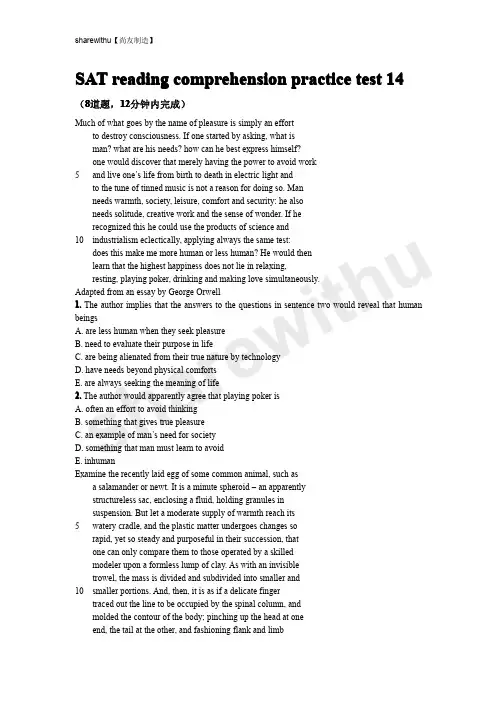
SAT reading comprehension practice test14(8道题,12分钟内完成)Much of what goes by the name of pleasure is simply an effortto destroy consciousness.If one started by asking,what isman?what are his needs?how can he best express himself?one would discover that merely having the power to avoid work5and live one’s life from birth to death in electric light andto the tune of tinned music is not a reason for doing so.Manneeds warmth,society,leisure,comfort and security:he alsoneeds solitude,creative work and the sense of wonder.If herecognized this he could use the products of science and10industrialism eclectically,applying always the same test:does this make me more human or less human?He would thenlearn that the highest happiness does not lie in relaxing,resting,playing poker,drinking and making love simultaneously.Adapted from an essay by George Orwell1.The author implies that the answers to the questions in sentence two would reveal that human beingsA.are less human when they seek pleasureB.need to evaluate their purpose in lifeC.are being alienated from their true nature by technologyD.have needs beyond physical comfortsE.are always seeking the meaning of life2.The author would apparently agree that playing poker isA.often an effort to avoid thinkingB.something that gives true pleasureC.an example of man’s need for societyD.something that man must learn to avoidE.inhumanExamine the recently laid egg of some common animal,such asa salamander or newt.It is a minute spheroid–an apparentlystructureless sac,enclosing a fluid,holding granules insuspension.But let a moderate supply of warmth reach its5watery cradle,and the plastic matter undergoes changes sorapid,yet so steady and purposeful in their succession,thatone can only compare them to those operated by a skilledmodeler upon a formless lump of clay.As with an invisibletrowel,the mass is divided and subdivided into smaller and10smaller portions.And,then,it is as if a delicate fingertraced out the line to be occupied by the spinal column,andmolded the contour of the body;pinching up the head at oneend,the tail at the other,and fashioning flank and limbinto due proportions,in so artistic a way,that,after15watching the process hour by hour,one is almostinvoluntarily possessed by the notion,that some more subtleaid to vision than a microscope,would show the hiddenartist,with his plan before him,striving with skilfulmanipulation to perfect his work.Adapted from an essay by T H Huxley3.The author makes his main point with the aid ofA.logical paradoxplex rationalizationC.observations on the connection between art and scienceD.scientific deductionsE.extended simile4.In the context of the final sentence the word“subtle”most nearly meansA.not obviousB.indirectC.discriminatingD.surreptitiousE.scientificPassage oneThere are not many places that I find it more agreeable torevisit when I am in an idle mood,than some places to whichI have never been.For,my acquaintance with those spots isof such long standing,and has ripened into an intimacy of5so affectionate a nature,that I take a particular interestin assuring myself that they are unchanged.I never was inRobinson Crusoe’s Island,yet I frequently return there.Iwas never in the robbers’cave,where Gil Blas lived,butI often go back there and find the trap-door just as heavy10to raise as it used to be.I was never in Don Quixote’sstudy,where he read his books of chivalry until he roseand hacked at imaginary giants,yet you couldn’t move abook in it without my knowledge.So with Damascus,andLilliput,and the Nile,and Abyssinia,and the North Pole,15and many hundreds of places—I was never at them,yet it is an affair of my life to keep them intact,and I amalways going back to them.Passage twoThe books one reads in childhood create in one’s mind asort of false map of the world,a series of fabulous20countries into which one can retreat at odd momentsthroughout the rest of life,and which in some cases caneven survive a visit to the real countries which they aresupposed to represent.The pampas,the Amazon,the coralislands of the Pacific,Russia,land of birch-tree and25samovar,Transylvania with its boyars and vampires,theChina of Guy Boothby,the Paris of du Maurier—one couldcontinue the list for a long time.But one otherimaginary country that I acquired early in life wascalled America.If I pause on the word“America”,and30deliberately put aside the existing reality,I can callup my childhood vision of it.Adapted from:The Uncommercial Traveller,C Dickens(1860)5.The first sentence of passage one contains an element ofA.paradoxB.legendC.melancholyD.humorE.self-deprecation6.By calling America an“imaginary country”the author of passage two implies thatA.America has been the subject of numerous works for childrenB.he has never seen AmericaC.his current vision of that country is not related to realityD.America has stimulated his imaginationE.his childhood vision of that country owed nothing to actual conditions7.Both passages make the point thatA.imaginary travel is better than real journeysB.children’s books are largely fictionC.the effects of childhood impressions are inescapableD.books read early in life can be revisited in the imagination many years laterE.the sight of imaginary places evokes memories8.Both passages list a series of places,but differ in that the author of passage oneA.has been more influenced by his list of locationsB.never expects to visit any of them in real life,whereas the writer of passage two thinks it at least possible that he mightC.is less specific in compiling his listD.wishes to preserve his locations in his mind forever,whereas the author of passage two wishes to modify all his visions in the light of reality.E.revisits them more oftenPractice Test14Question Your Answer Correct Answer1.D2.A3.E4.C5.A6.E7.D8.B。
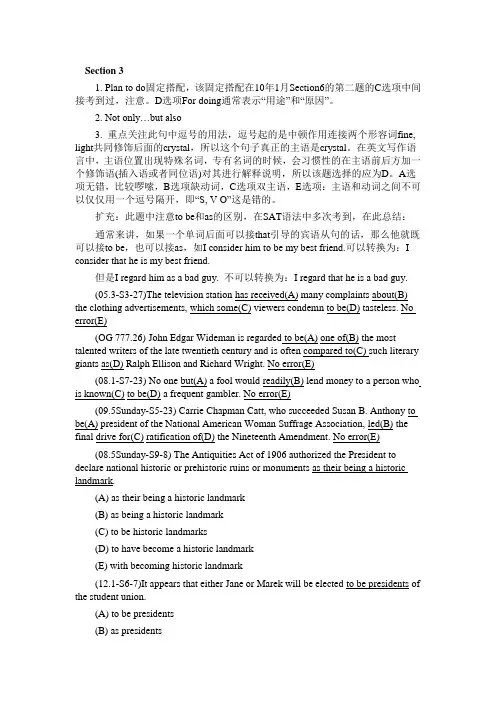
Section 31. Plan to do固定搭配,该固定搭配在10年1月Section6的第二题的C选项中间接考到过,注意。
D选项For doing通常表示“用途”和“原因”。
2. Not only…but also3. 重点关注此句中逗号的用法,逗号起的是中顿作用连接两个形容词fine, light共同修饰后面的crystal,所以这个句子真正的主语是crystal。
在英文写作语言中,主语位置出现特殊名词,专有名词的时候,会习惯性的在主语前后方加一个修饰语(插入语或者同位语)对其进行解释说明,所以该题选择的应为D。
A选项无错,比较啰嗦,B选项缺动词,C选项双主语,E选项:主语和动词之间不可以仅仅用一个逗号隔开,即“S, V O”这是错的。
扩充:此题中注意to be和as的区别,在SAT语法中多次考到,在此总结:通常来讲,如果一个单词后面可以接that引导的宾语从句的话,那么他就既可以接to be,也可以接as,如I consider him to be my best friend.可以转换为:I consider that he is my best friend.但是I regard him as a bad guy. 不可以转换为:I regard that he is a bad guy.(05.3-S3-27)The television station has received(A) many complaints about(B) the clothing advertisements, which some(C) viewers condemn to be(D) tasteless. No error(E)(OG 777.26) John Edgar Wideman is regarded to be(A) one of(B) the most talented writers of the late twentieth century and is often compared to(C) such literary giants as(D) Ralph Ellison and Richard Wright. No error(E)(08.1-S7-23) No one but(A) a fool would readily(B) lend money to a person who is known(C) to be(D) a frequent gambler. No error(E)(09.5Sunday-S5-23) Carrie Chapman Catt, who succeeded Susan B. Anthony to be(A) president of the National American Woman Suffrage Association, led(B) the final drive for(C) ratification of(D) the Nineteenth Amendment. No error(E)(08.5Sunday-S9-8) The Antiquities Act of 1906 authorized the President to declare national historic or prehistoric ruins or monuments as their being a historic landmark.(A) as their being a historic landmark(B) as being a historic landmark(C) to be historic landmarks(D) to have become a historic landmark(E) with becoming historic landmark(12.1-S6-7)It appears that either Jane or Marek will be elected to be presidents of the student union.(A) to be presidents(B) as presidents(C) presidents(D) for president(E) president答案:DAEACE4. ACE中it is+ adj.这样的句型在IS中是一个不好的句型,不简洁,不会优先考虑,并且A也用错了,应该是it is+adj.+for+ to do,D选项is左右两边不对等,disappointment和when不是同一个概念。
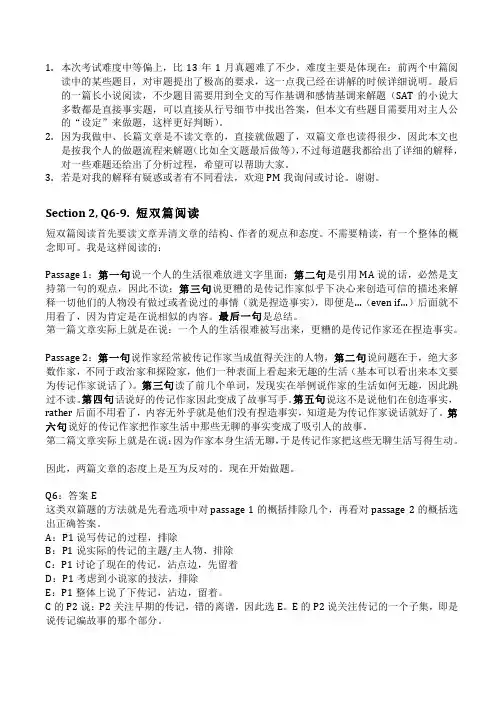
1.本次考试难度中等偏上,比13年1月真题难了不少。
难度主要是体现在:前两个中篇阅读中的某些题目,对审题提出了极高的要求,这一点我已经在讲解的时候详细说明。
最后的一篇长小说阅读,不少题目需要用到全文的写作基调和感情基调来解题(SAT的小说大多数都是直接事实题,可以直接从行号细节中找出答案,但本文有些题目需要用对主人公的“设定”来做题,这样更好判断)。
2.因为我做中、长篇文章是不读文章的,直接就做题了,双篇文章也读得很少,因此本文也是按我个人的做题流程来解题(比如全文题最后做等),不过每道题我都给出了详细的解释,对一些难题还给出了分析过程,希望可以帮助大家。
3.若是对我的解释有疑惑或者有不同看法,欢迎PM我询问或讨论。
谢谢。
Section 2, Q6-‐9. 短双篇阅读短双篇阅读首先要读文章弄清文章的结构、作者的观点和态度。
不需要精读,有一个整体的概念即可。
我是这样阅读的:Passage 1:第一句说一个人的生活很难放进文字里面;第二句是引用MA说的话,必然是支持第一句的观点,因此不读;第三句说更糟的是传记作家似乎下决心来创造可信的描述来解释一切他们的人物没有做过或者说过的事情(就是捏造事实),即便是…(even i f…)后面就不用看了,因为肯定是在说相似的内容。
最后一句是总结。
第一篇文章实际上就是在说:一个人的生活很难被写出来,更糟的是传记作家还在捏造事实。
Passage 2:第一句说作家经常被传记作家当成值得关注的人物,第二句说问题在于,绝大多数作家,不同于政治家和探险家,他们一种表面上看起来无趣的生活(基本可以看出来本文要为传记作家说话了)。
第三句读了前几个单词,发现实在举例说作家的生活如何无趣,因此跳过不读。
第四句话说好的传记作家因此变成了故事写手。
第五句说这不是说他们在创造事实,rather后面不用看了,内容无外乎就是他们没有捏造事实,知道是为传记作家说话就好了。
第六句说好的传记作家把作家生活中那些无聊的事实变成了吸引人的故事。
2013年SAT阅读实践练习题-文学SAT Subject Test PracticeLiteratureWell versed in literature? The Literature Subject Test gives you the opportunity to highlight your strengths in reading and interpreting literary texts from a variety of historical periods and genres. Taking the test also gives you the opportunity to showcase your interests and enhance your college application.Read the following poem carefully before you choose your answers.(A) "defects" (line 2)(B) "utmost sum" (line 3)(C) "strangely" (line 5)(D) "love, converted" (line 7)(E) "settled gravity" (line 8)The correct answer is AExplanationDifficulty: EasyChoice A is correct. The word "defects" refers to the speaker's sense of his own weaknesses or failures to meet the expectations of others. It would support an argument by the speaker that hedid not deserve to be loved.2、The speaker of the poem is addressing(A) an unspecified general audience(B) a friend of the speaker's beloved(C) a lover(D) a former lover(E) a legal adviserThe correct answer is CExplanationDifficulty: MediumChoice C is correct. The person being addressed in the poem is presented as loving and being loved by the speaker.3、The speaker imagines a time in the future when he might(A) no longer be in love(B) no longer be loved(C) be even more deeply in love(D) be able to explain why he is in love(E) look back fondly on his present happinessThe correct answer is BExplanationDifficulty: MediumChoice B is correct. Lines 2-8 describe an imagined time when the person being addressed will be critical of the speaker and no longer care for him.4、In line 5, the adverb "strangely" means:(A) oddly(B) be even more deeply in love(C) in a distant manner(D) eerily(E) haltinglyThe correct answer is CExplanationDifficulty: MediumChoice C is correct. In lines 5-6, the speaker imagines a time when the person being addressed no longer wishes to meet him. The person passes by "strangely," like someone who is almost a stranger, who "scarcely greets" the speaker and assumes "a distant manner."5、In lines 1, 5, and 9, "against" is best understood to mean:(A) in opposition to(B) in repetition of(C) in contrast to(D) in preparation for(E) in rejection ofThe correct answer is DExplanationDifficulty: MediumChoice D is correct. In lines 1 and 5, the speaker uses "Against that time" to imagine a situation that he anticipates and fears; he uses the phrase again in line 9 to present his preparations for dealing with this situation.6、The "reasons" mentioned in line 8 are best characterized as:(A) scientific explanations for a natural force(B) arguments against rationality itself(C) arguments for the importance of loving(D) logical explanations for the absence of love(E) counterarguments to the speaker's propositionsThe correct answer is DExplanationDifficulty: MediumChoice D is correct. Lines 7-8 indicate that love personified (the lover's feelings) has found "reasons" that justify rejecting the speaker's love.7、One theme of the poem appears to be that:(A) unrequited love is still sweet(B) time transforms lust into love(C) the value of true love cannot be calculated(D) relationships should be controlled by laws(E) reason is insufficient to explain loveThe correct answer is DExplanationDifficulty: MediumChoice E is correct. The speaker refers to "reasons" (line 8), "lawful reasons" (line 12), and "laws" (line 13) that seemingly support behavior with rational motives. In line 14, however, the speaker suggests two related ideas: that reason cannot explain why he is loved and that, since he clearly is loved, reason lacks an adequate way to explain the behavior of lovers.8、In lines 1-12, which of the following is a main verb?(A) "come" (line 1)(B) "shall see" (line 2)(C) "shalt pass" (line 5)(D) "shall find" (line 8)(E) "do ensconce" (line 9)The correct answer is EExplanationDifficulty: HardChoice E is correct. The verb phrase "do ... ensconce," appearing in a section of the poem (lines 9-12) that functions as a main clause would in a sentence, resolves the tension of the modifying clauses represented in lines 1-8.9、Which of the following best describes the language of the poem?(A) Concrete and matter-of-fact(B) Euphemistic and prosaic(C) Metaphoric and logical(D) Informal and conversational(E) Ironic and amusedThe correct answer is CExplanationDifficulty: HardChoice C is correct. The speaker makes his points through devices like personification ("thy love hath cast" in line 3), metaphorical comparisons ("that sun, thine eye" in line 6), and abstractions ("lawful reasons" in line 12). The repetition of "Against that time" also organizes the poem by lending it the systematic structure of a logical argument.10、After Granny’s “Good mornin” (line 7), the camera man probably behaves as he does because he(A) is made to realize that he is intruding(B) suspects that he is in physical danger(C) hopes to win Granny’s affection by appearing at ease(D) is relieved that an adult is present(E) realizes that he is disturbing the tidiness of the yardThe correct answer is AExplanationDifficulty: EasyChoice (A) is correct. Lines 1-7 of the passage set the scene for the conversation that follows: Granny sees the cameraman “cut*ting+ across our neighbor’s yard” and comes outside to confront him (“the screen door bammin soft and scratchy against her palms”). As the cameraman begins to speak, “Granny cut him off. And smiled that smile.” Granny’s curt greeting (“Good mornin’”) and no-nonsense manner make the cameraman realize that he is intruding, as his reaction makes clear: “‘Good mornin’,’ he said, head all down the way Bingo does when you yell at him.” The cameraman seems to feel uncomfortable and hesitant, although he still tries to complete his task of f ilming Granny’s house.11、The tone of “Now, aunty” (line 37) is most accurately described as(A) expectant(B) patronizing(C) accusatory(D) obedient(E) respectfulThe correct answer is BExplanationDifficulty: EasyChoice (B) is correct. In this context, “patronizing” means condescending, or assuming undue familiarity with a person perceived to be inferior. Referring to a person to whom one is not related as “aunty” is patronizing and disrespectful. The cameraman’s lack of respect for Granny is em phasized by the fact that he is “pointin *the camera+ straight at her,” despite having been asked to turn it off. Presumably, it is only because the cameraman feels superior to Granny that he calls her “aunty” rather than using a more respectful term like “ma’am.”12、Granny’s final comment can best be understood as a(A) reluctant confession(B) tentative assertion(C) witty joke(D) surprising revelation(E) strong rebukeThe correct answer is EExplanationDifficulty: EasyChoice (E) is correct. When Granny tells the cameraman, “Your mama and I are not related,” she is doing more than clarifying that she is not his “aunty”; she is also rebuking him, or criticizing him sharply and angrily. Granny’s anger towards the cameraman has been building thro ughout the passage: first, she “cut him off” and “smiled that smile” (lines 7-8); then, she said “with no smile” that she did mind the filming (line 29); last, speaking “real low through her teeth” as she “took a step down off the porch and then another,” she warned the cameraman to “shut that machine off” (lines 34-36). In the last line of the passage, Granny forcefully expresses her anger towards the cameraman by rejecting his insulting use of the term “aunty.”13、The episode reveals a conflict between(A) propriety and impertinence(B) virtue and corruption(C) kindness and cruelty(D) passiveness and aggression(E) refinement and grossnessThe correct answer is AExplanationDifficulty: EasyChoice (A) is correct. Granny displays “propriety,” or polite and appropriate behavior, while the cameraman displays “impertinence,” or rude and inappropriate behavior. The cameraman is not hostile or vulgar in his dealings with Granny, but his rude treatment is evident in his use of the patronizing term “aunty” and his failure to ask permission to film or apologize for his intrusion onto Granny’s property; in short, the cameraman does not treat Granny with proper respect. Granny, on the other hand, politel y greets the cameraman with the phrase “Good mornin’” and a curt smile, and asserts through her speech and actions (“‘I do indeed,’ said Granny with no smile”) that she considers his behavior to be an improper intrusion. Granny is angry, but she does not shout or curse; she simply states, with appropriate directness, that she does not appreciate the cameraman’s actions.14、The excerpt is best described as(A) an enthusiastic celebration of youthful optimism(B) an ironic self-portrait colored by satiric observations(C) an imaginative evocation without didactic intention(D) a symbolic representation of intellectual creativity(E) a narrative episode with philosophical implicationsThe correct answer is EExplanationDifficulty: MediumChoice (E) is correct. The excerpt is a narrative episode with philosophical implications, or a story that deals with issues of nature, reality, and perception. The narrative elements of the poem are evident throughout: the speaker tells the story of events that began w hen he or she “found/A little boat” and decided to take it out on the water. Feeling exhilarated, the speaker suddenly sees “a huge peak, black and huge,” and guiltily turns “Back to the covert of the willow tree,” after which “for many days . . . There hung a darkness, call it solitude/Or blank desertion.” The philosophical elements of the poem are most evident in the discussion of the speaker’s feelings after the event; the speaker grapples with “a dim and undetermined sense/Of unknown modes of being.” Is the speaker awed by the peak because he or she is already feeling guilty about having stolen the boat? Or is there some external force in nature that governs our internal feelings and actions? The questions the poem raises have philosophical implications.15、In lines 1-7, which of the following devices is used to present nature, the boat, and the mountain echoes?(A) Personification(B) Apostrophe(C) Rhyme(D) Paradox(E) SimileThe correct answer is AExplanationDifficulty: MediumChoice (A) is co rrect. “Personification” is the attribution of human qualities to an object or abstraction. Nature, the boat, and the mountain echoes are all personified to some degree in lines 1-7. The speaker first refers to nature as “her” (“led by her”), then calls the cave the boat’s “home” and refers to the boat as “her” (“unloosed her chain”), and finally refers to “the voice/Of mountain echoes.” The speaker’s words subtly convey the impression that nature, the boat, and the mountain echoes are like human characters in the episode and are not merely things.16、In lines 6-7, “the voice/Of mountain-echoes” serves to reinforce the speaker’s sense of(A) freedom(B) omnipotence(C) furtiveness(D) enthusiasm(E) despondencyThe correct answer is CExplanationDifficulty: MediumChoice (C) is correct. “Furtive” means stealthy or surreptitious; a person who is breaking a rule or law or otherwise behaving unethically, in secret, could be said to be behaving in a furtive manner. In lines 5-7, the speaker acknowledges the furtiveness of borrowing a boat that did not belong to him or her: “It was an act of stealth/And troubled pleasure, nor without the voice/Of mountain-echoes did my boat move on.” The reference to the “voice” of the “mountain-echoes” indicates that the speaker, no doubt wary of making too much noise, was acutely conscious of the sounds all around him; the reference thus reinforces the speaker’s sense of furtiveness.17、Which of the following best describes the change in the outlook of the speaker during the course of this excerpt?(A) Naïveté to cynicism(B) Bravery to cowardice(C) Hope to despair(D) Daring to uncertainty(E) Eagerness to slothThe correct answer is DExplanationDifficulty: MediumChoice (D) is correct. The outlook of the speaker at the beginning of the excerpt would best be described as "daring," or bold and adventurous. Having boldly taken a small boat out on the lake for an evening adventure, the speaker describes himself or herself as "like one who rows,/Proud of his skill"; the speaker even uses the adverb "lustily" to convey the confidence with which he or she piloted the boat. But the speaker’s outlook shifts dramatically when he or she speaks of seeing the "huge peak, black and huge": the speaker turned back to the shore "With trembling oars . . . And through the meadows homeward went, in grave/And serious mood." The speaker reveals that in the days that followed, he or she was profoundly shaken and confused by the experience: "for many days, my brain/Worked with a dim and undetermined sense/Of unknown modes of being; o'er my thoughts/There hung a darkness." During the course of the excerpt, the speaker clearly passes from a daring outlook to one of "uncertainty," or one lacking conviction and confidence.18、The dramatic situation in the poem is that of(A) a youth speaking to a lover(B) a priest speaking to a sinner(C) a reformer addressing an impoverished person(D) God addressing any human soul(E) an individual addressing his or her own soulThe correct answer is EExplanationDifficulty: HardChoice (E) is correct. Beginning in line 1, the speaker directly addresses his or her soul: “Poor soul, the centre of my sinful earth” (“earth” means “body,” as the following lines make clear). Throughout the rest of the poem, the speaker discusses the relationship between his or her soul and physical body. When the speaker refers to “thy outward walls,” “thy fading mansion,” “thy charge,” and so on, he or she is referring to the body, which will ultimately die and be eate n byworms (“Shall worms, inheritors of this excess/Eat up thy charge? Is this thy body’s end?”). The message of the poem is that the (inner) soul should stop worrying about the (outer) body and should essentially let the body wither and die, knowing that the soul is all that matters in the afterlife (“Then, soul, live thou upon thy servant’s loss”). The dramatic situation of the poem is that of an individual—the speaker—addressing his or her own soul.19、In the context of the poem, “Painting thy outward walls so costly gay” (line 4) refers to(A) camouflage(B) writing poetry(C) attending to physical appearances(D) pretending to be happy(E) preparations for a celebrationThe correct answer is CExplanationDifficulty: HardChoice (C) is correct. At the beginning of the poem, the speaker addresses his or her soul (“Poor soul, the centre of my sinful earth”), and asks why the soul is “Painting thy outward walls so costly gay?” The “outward walls” of the soul refer to the speaker’s physical body, which is being adorned in an expensive and showy manner (“so costly gay”). Lines 3-4 of the poem ask why the soul is attending to physical appearances while neglecting the nourishment the soul needs (“pine within and suffer dearth”)—presumably from spiritual or religious sources.20、The poet signals a major shift at line 9 by changing from(A) entirely negative to entirely positive imagery(B) imagery of permanence to imagery of change(C) direct address to impersonal statement(D) material to spiritual imagery(E) questions to commandsThe correct answer is EExplanationDifficulty: HardChoice (E) is correct. The first eight lines of the poem feature four consecutive questions. The speaker is essentially asking the soul why so much attention is being pai d to the body (“thy outward walls,” “thy fading mansion”), which is only going to die and be consumed by worms (“Is北京新航道学校this thy body’s end?”). In other words, the speaker is asking why the immortal soul is sacrificing its needs in favor of those of the “sinful” and dying body. The speaker’s questions are rhetorical; he or she is using the questions to subtly make the point that spiritual concerns should be emphasized over material things. This point is made more explicit at line 9, when the speaker turns to co mmands: “Then, soul, live thou upon thy servant’s loss,/And let that pine to aggravate thy store . . .” The speaker is commanding the soul to let the body wither and die, knowing that the soul is all that matters in the afterlife (“there’s no more dying then”).21、Which of the following best describes the theme of the concluding couplet (lines 13-14)?(A) A confession of sin before an almighty judge(B) An affirmation of the immortality of the soul(C) A declaration of rebellion against the powers of fate(D) An accusation that death is a faithless servant(E) A surrender to the inexplicable nature of lifeThe correct answer is BExplanationDifficulty: HardChoice (B) is correct. Throughout the poem, the speaker directly addresses the soul. The speaker first questions his or her soul and then commands it to put its own needs over those of the body: “live thou upon thy servant’s loss,/And let that pine to aggravate thy store . . .” In other words, the speaker advocates ignoring physical or material conce rns and focusing on increasing one’s spiritual wellbeing. The last two lines of the poem carry this idea to its logical conclusion: the soul should “feed on Death, that feeds on men,/And Death once dead, there’s no more dying then.” To paraphrase: the body will wither and die but the immortal soul will be enriched, and, having benefited from the death of the body, the soul will transition into some kind of eternal paradise. The image is a fascinating one: while Death is feeding on the body, weakening and ultimately killing it, the soul is feeding on Death, using the suffering of the body to improve its spiritual fitness or closeness to God, in preparation for the eternal afterlife. The theme of these lines is best described as an affirmation of the immortality of the soul.。
SAT reading comprehension practice test11(8道题,12分钟内完成)I chose to wander by Bethlehem Hospital;partly,because it layon my road round to Westminster;partly,because I had a fancyin my head which could be best pursued within sight of itswalls.And the fancy was:Are not the sane and the insane5equal at night as the sane lie a dreaming?Are not all of usoutside this hospital,who dream,more or less in thecondition of those inside it,every night of our lives?Arewe not nightly persuaded,as they daily are,that we associatepreposterously with kings and queens,and notabilities of all10sorts?Do we not nightly jumble events and personages and timesand places,as these do daily?Said an afflicted man to me,when I visited a hospital like this,‘Sir,I can frequentlyfly.’I was half ashamed to reflect that so could I-by night.I wonder that the great master,when he called Sleep the death15of each day’s life,did not call Dreams the insanity of eachday’s sanity.Passage adapted from:The Uncommercial Traveller,C Dickens(1860)1.It can be correctly inferred that Bethlehem hospitalI is very close to WestminsterII has patients who are regarded as insaneIII is a place the author has visited beforeA.I onlyB.II onlyC.III onlyD.I and IIE.I,II and III2.The author makes his point with the aid of all of the following exceptA.rhetorical questionsB.personal anecdoteC.allusionD.frequent use of metaphorE.repetition and parallel constructionNow,it is clear that the decline of a language must ultimatelyhave political and economic causes:it is not due simply to thebad influence of this or that individual writer.But an effectcan become a cause,reinforcing the original cause and producing5the same effect in an intensified form,and so on indefinitely.A man may take to drink because he feels himself to be afailure,and then fail all the more completely because hedrinks.It is rather the same thing that is happening to theEnglish language.It becomes ugly and inaccurate because our10thoughts are foolish,but the slovenliness of our languagemakes it easier for us to have foolish thoughts.Passage adapted from:Politics And The English Language,George Orwell3.The example of the man who takes to drink is used to illustrate which of the following ideas in the paragraph?A.foolish thoughtsB.the slovenliness of languageC.political and economic causesD.an effect becoming a causeE.bad influences4.The author would most likely agree thatA.individual writers can never have a bad influence on the English languageB.imprecise use of language is likely to make precise thought more difficultC.the English language is ugly and inaccurateD.all language declines for political reasonsE.failure generally leads to more failure in a downward spiralParagraph oneAll the sound reasons ever given for conserving other naturalresources apply to the conservation of wildlife–and withthree-fold power.When a spendthrift squanders his capital itis lost to him and his heirs;yet it goes somewhere else.5When a nation allows any one kind of natural resource to besquandered it must suffer a real,positive loss;yetsubstitutes of another kind can generally be found.But whenwildlife is squandered it does not go elsewhere,likesquandered money;it cannot possibly be replaced by any10substitute,as some inorganic resources are:it is simply anabsolute,dead loss,gone beyond even the hope of recall.Paragraph twoThe public still has a hazy idea that Nature has an overflowing sanctuaryof her own,somewhere or other,which will fill up the gapsautomatically.The result is that poaching is commonly15regarded as a venial offence,poachers taken red-handed arerarely punished,and willing ears are always lent to the crythat rich sportsmen are trying to take the bread out of thepoor settler's mouth.The poor settler does not reflect thathe himself,and all other classes alike,really have a20common interest in the conservation of any wildlife thatdoes not conflict with legitimate human development.Both passages adapted from:Animal Sanctuaries in Labrador,W Wood(1911)5.The author of paragraph one probably uses the expression‘three-fold power’A.because there are three-times as many reasons for conserving wildlifeB.to be more dramatic that saying“double-power”C.to emphasize the contrast between loss of money,loss of other resources,and loss of wildlifeD.to stress the need for saving money,resources and timeE.to indicate the magnitude of the problem without intending the expression to be taken literally6.From the context,the word‘venial’in paragraph two most nearly meansA.majorB.criminalC.frequentD.trivialE.natural7.Both paragraphs apparently imply thatA.there is no source from which wildlife,once exterminated,can be replacedB.poachers must be punishedC.wildlife has much in common with other natural resourcesD.conservation is in conflict with human developmentE.preserving wildlife is expensive8.It can be inferred that the spendthrift in paragraph one and the poor settler mentioned in paragraph two are alike in that they areA.in conflict with the aims of conservationB.inclined to waste natural resourcesC.more concerned with the present than the futureD.unable to control their spendingE.unaware of conservationPractice Test11Question Your Answer Correct Answer1.B2.D3.D4.B5.C6.D7.A8.C。
2013年5月sat 写作真题解析啄木鸟教育孔令伊老师一、2013写作趋势分析1、题目不常规从2012年以来,sat的作文题就给人一种时不时在抽风的感觉。
一看到题目就有一种“你在玩儿我吧!”分的八大类别的题目和例子完全没有用好么?!但的确如此么?我们仔细看看这些题目。
比方说2012年五月,Do advertisements contribute to unhappiness and dissatisfaction? 看起来很不常规的题目,往往让考生在考的时候直接进入放弃模式。
自然,如果说此时可以想到几个具体的广告的例子并且论述的话是更好的,但是用我们平时准备的例子也并不是没有生路了。
比方说转换为大众观点的题目,广泛传播的大众观点会不会给人们带来困扰?再比方说可以转换为成功类的题目,广告可不可以激励成功?等等。
只要我们耐下性子不被它吓到,这些所谓的偏题怪题也就没有那么偏那么怪了。
再来看2013年5月的题目,Is preparing for the future more important than enjoying the present?要及时行乐还是未雨绸缪。
看起来和常规的题目也离得挺远,和之前每一类的题目都不能直接联系上。
但是仔细去分析一下,enjoy 享受,那可以理解为happiness,在看future,可以理解为成功,后果等等。
那这个题目通过可以转换付出努力后的成功,这样的题目就非常常规熟悉了。
2、很难直接套用例子。
虽然说可以转换思维,把题目换成我们熟悉的话题来写,但是2012,2013年的题目还是给人一种例子不知道该怎么用的感觉。
这对大家平时的积累就又有了新的要求。
(1)经典的例子要灵活使用。
我们准备的例子是有限的,但是每个例子都可以用不同的发散。
比方说BILL GATES,可以用来说成功,说机遇,说学习,说创新,也可以用来说社会责任,慈善等等。
既然已经准备了一个例子,就把这个人挖掘得更加透彻一些,让这个例子可以辐射更多的题目。
2013高考英语真题特色题型详细解析―阅读七选五(六选五)Dshould help you bring out your personality, not try to turn you into someone you're not.A. You aren't like anybody elseB. You already do lots of things wellC. Turn your back on too many rulesD. Check the rules about dos and don'tsE. Whatever the presentation, public speaking is toughF .The one thing you don't want is for them to fall asleepG. So trying to force a whole set of rules into it will just make things worse三、(2013北京卷)UrbanizationUntil relatively recently, the vast majority of human beings lived and died without ever seeing a city. The first city was probably founded no more than 5,500 years ago. 71_ . In fact, nearly everyone lived on farms or in tiny rural (乡村的) villages. It was not until the 20th century that Great Britain became the first urban society in history--- a society in which themajority of people live in cities and do not farm for a living.Britain was only the beginning. 72_ .The process of urbanization--- the migration (迁移) of people from the countryside to the city--- was the result of modernization, which has rapidly transformed how people live and where they live. In 1990, fewer than 40% of Americans lived in urban areas. Today, over 82% of Americans live in cities. Only about 2% live on farms. 73 .Large cities were impossible until agriculture became industrialized. Even in advanced agricultural societies. It took about ninety-five people on farms to feed five people in cities. _74 . Until modern times, those living in cities were mainly the ruling elite(精英) and the servants, laborers and professionals who served them. Cities survived by taxing farmers and were limited in size by the amount of surplus food that the rural population producedand by the ability to move this surplus from farm to city.Over the past two centuries, the Industrial Revolution has broken this balance between the city and the country. 75_ . Today, instead of needing ninety-five farmers to feed five city people, one American farmer is able to feed more than a hundred non-farmers.A. That kept cities very small.B. The rest live in small towns.C. The effects of urban living on people should be considered.D. Soon many other industrial nations become urban societies.E. But even 200 years ago, only a few people could live in cities.F. Modernization drew people to the cities and made farmers more productive.G. Modern cities have destroyed social relations and the health of human beings.四、(2013辽宁卷)ForgivenessTo forgive is a virtue, but no one has ever said it is easy. When someone has deeply hurt you, it can be extremely difficult to let go of your hate. However, forgiveness is possible, and it can be surprisingly beneficial to your physical and mental health. People who forgive show less sadness, anger and stress and more hopefulness, according to a recent research.________71_______ Try the following steps: Calm yourself. ________72_______ You can take a couple of breaths and think of something that gives you pleasure: a beautiful scene in nature, or someone you love.Don’t wait for an apology. Many times the person who hurt you does not intend to apologize. They may have wanted to hurt you or they just don’t see things the same way. ________73_______ Keep in mind that forgiveness does not necessarily mean becoming friends again with the person who upset you. Take the control away from your offender(冒犯者). Rethinking about you hurt gives power tothe person who causes you pain. Instead of focusing on your mounded feelings, learn to look for the love, beauty and kindness around you.________74_______ If you understand your offender, you may realize that he or she was acting out of unawareness, fear, and even love. You may want to write a letter to yourself from your offender’s point of v iew.Don’t forget to forgive yourself. ________75_______ But it can rob you of your self-confidence if you don’t do it.A. Why should you forgive?B. How should you start to forgive?C. Recognize the benefits of forgiveness.D. Try to see things from y ou offender’s angle.E. For some people, forgiving themselves is the biggest challenge.F. To make your anger die away, try a simple stress-management technique.G..If you wait for people to apologize, you could be waiting an awfully long time.答案一本文是一篇讨论商务和商务管理的说明文。
SAT test 51.For a long time, most doctors maintained that taking massive doses of vitamins was relatively harmless; now, however, some are warning that excessive dosages can be ________ .(A)healthy adj.健康的(B)expensive adj.昂贵的(C)wasteful adj.浪费的(D)toxic adj.有毒的(E)inane adj.愚蠢的解析:D,在很长的一段时间里,大多数医生认为用大量的维他命是无害的;不过现在有些人警告过量食用会・・・・。
这里however表示转折与前面的harmless是相反的意思。
2.In Jamaica Kincaid's novel Lucy, the west Indian heroine _________ her employers' world, critically examining its assumptions and values.(A)idealizes v.理想化(B)avoids v.避开(C)beautifies v.美化(D)scrutinizes v.仔细检查(E)excludes v.排除,解析:E,在牙买加金彩的小说露西,这个西印度群M英雄--她的雇主的世界,精细的审视他的猜测和价值。
这个句子中前后两句意思是一致的,没有转折词,所以空格所需的东西与examining 是同义词,所以D。
3.The frequent name changes that the country has undergone________ the political turbulence that has attended its recent histoiy.(A)argue against v.真钞,辩论(B)contrast with v.对比,差异(C)testify to v.证明(D)jeopardize v.危及(E)sustain v.支撑解析:C,这个国家经历了频繁的国名变更…这个国家的近点史上的政治动乱。